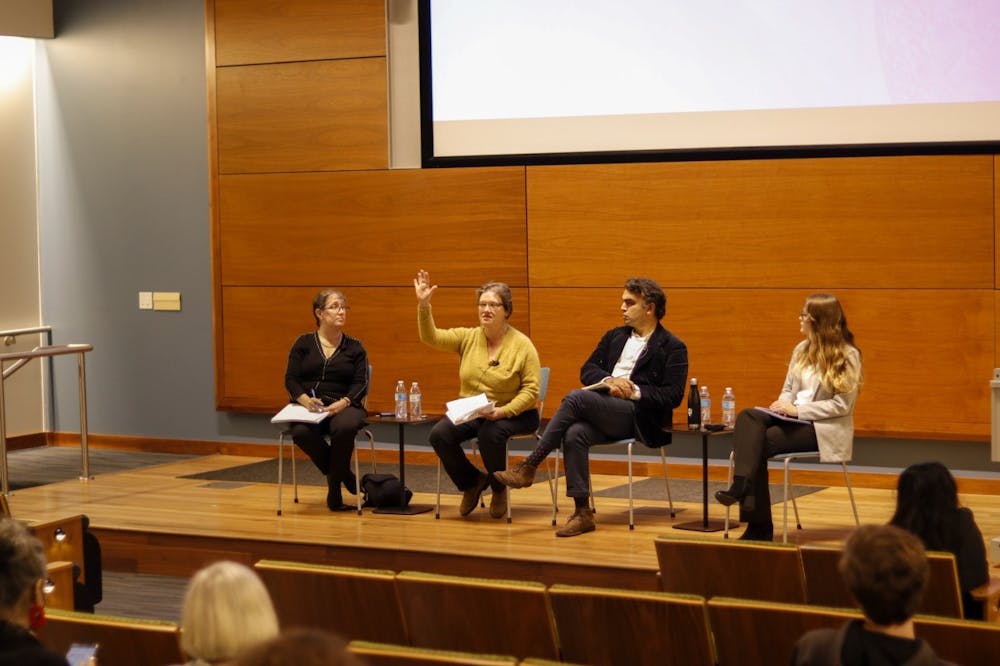In a panel discussion Wednesday night, experts in global democracy leaned on past international examples to discuss a key election issue: reproductive rights.
“We’re in this crucial moment right now where there is a real need for global solidarity movements against arbitrary state prerogatives of any kind on women’s bodies,” said Hussein Banai, assistant professor of international studies.
The Hamilton Lugar School of Global and International Studies hosted the panel, titled “Reproductive Rights and Democracy: Global Lessons and Implications of Abortion Bans,” at 6 p.m. Oct. 12 in the school’s Shreve Auditorium. Speakers included Judy Failer, associate professor of political science, and Maria Bucur, John W. Hill Chair of East European History and professor of history as well as Banai.
The discussion opened with a speech from Shruti Rana, Hamilton Lugar’s senior assistant dean for curricular and undergraduate affairs, who stressed the importance of reproductive rights and voting this election season. In the May 3 primaries, Rana said 32 people voted at the IMU; for reference, in fall 2021, 34,253 students were enrolled at IU, according to U.S. News. She challenged the audience to help raise that number in this upcoming election.
In their opening statements, speakers first looked at historical examples of reproductive rights battles.
Banai compared the U.S.’s rollback of reproductive rights to Iranian female-led resistance movements, both the original 1979 movement and more modern ones. What the Iranian movements have in common, he said, was that leaders saw oppressing women as the way to signify their politics to Iranian society as a whole.
Taking away reproductive rights, Banai said, is not a cultural issue. It’s a political tool used to concentrate power and further interests. Iran’s quick turnaround, which led to women’s repression post-revolution and a spike in undercover abortions, is what happens when basic human rights are taken away.
“There’s a direct warning from Iran, and a direct appeal to our conscience that when it comes to bodily autonomy,” Banai said. “It is absolutely linked to the type of regime and government that you have in place.”
Bucur focused on eastern Europe’s history of abortion in communist states. Reproductive rights were initially controlled, she said, and abortion was legal because the state needed workers, which included women. In Romania, where she’s from, it wasn’t until 1967 when abortion became illegal — and when it did, its enforcement was extremely strict.
When the Dobbs decision, which overturned Roe v. Wade, was released, Bucur was in Romania. The trauma the past abortion ban had caused was such that people couldn’t understand what they were hearing; to them, the idea that abortion could still be criminalized was unconscionable.
“Everybody, everywhere I went, was trying to understand, ‘is it really what I think it is?,’” Bucur said. “Is it that the United States — the place that we worship, that we think is the coolest place on the planet, everybody wants to come visit and possibly move here — did this place just make abortion illegal?”
Unlike the others, Failer focused on American history and what rights we’ve come to expect. The original Roe decision, she said, recognized three interests present in the abortion question: the obligation of states to keep their citizens healthy and happy, the obligation to the life of the fetus and the pregnant person’s right to make a decision regarding their pregnancy.
Different abortion-related decisions have balanced those interests in different ways, Failer said, but the Dobbs decision ignored the third interest entirely, which she said means the court believes women don’t have that right. To her, that was the most distressing part of the decision, as it ignored the humanity of one of life’s most personal decisions.
But to Failer, the issue lies with democracy’s interaction with minority rights as a whole. Democracy is based on a majority system, she said, so most decisions will come at the detriment of some. However, she also said the point of having a right, like a right to make reproductive decisions, was that the government has a duty to protect it.
Questions ranged in topic, but when asked about how to start a conversation about reproductive rights in a biased system, Bucur stressed the difference between personal beliefs and what’s outlined in the constitution — specifically, separation of church and state. If abortion is legal, she said, anti-abortion supporters aren’t obligated to undergo an abortion, but outlawed abortion doesn’t apply to all religions.
Banai agreed. A majority of Americans support keeping the state out of this decision, he said, and, like Iran, the decision to overturn Roe is a case of a minority consolidating power.
“It’s so important to not be sleeping and to actively talk about it,” Banai said. “Make sure it’s front and center.”




